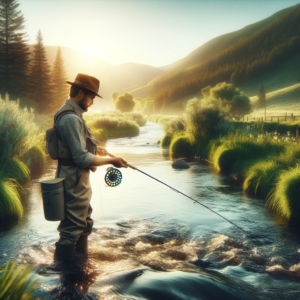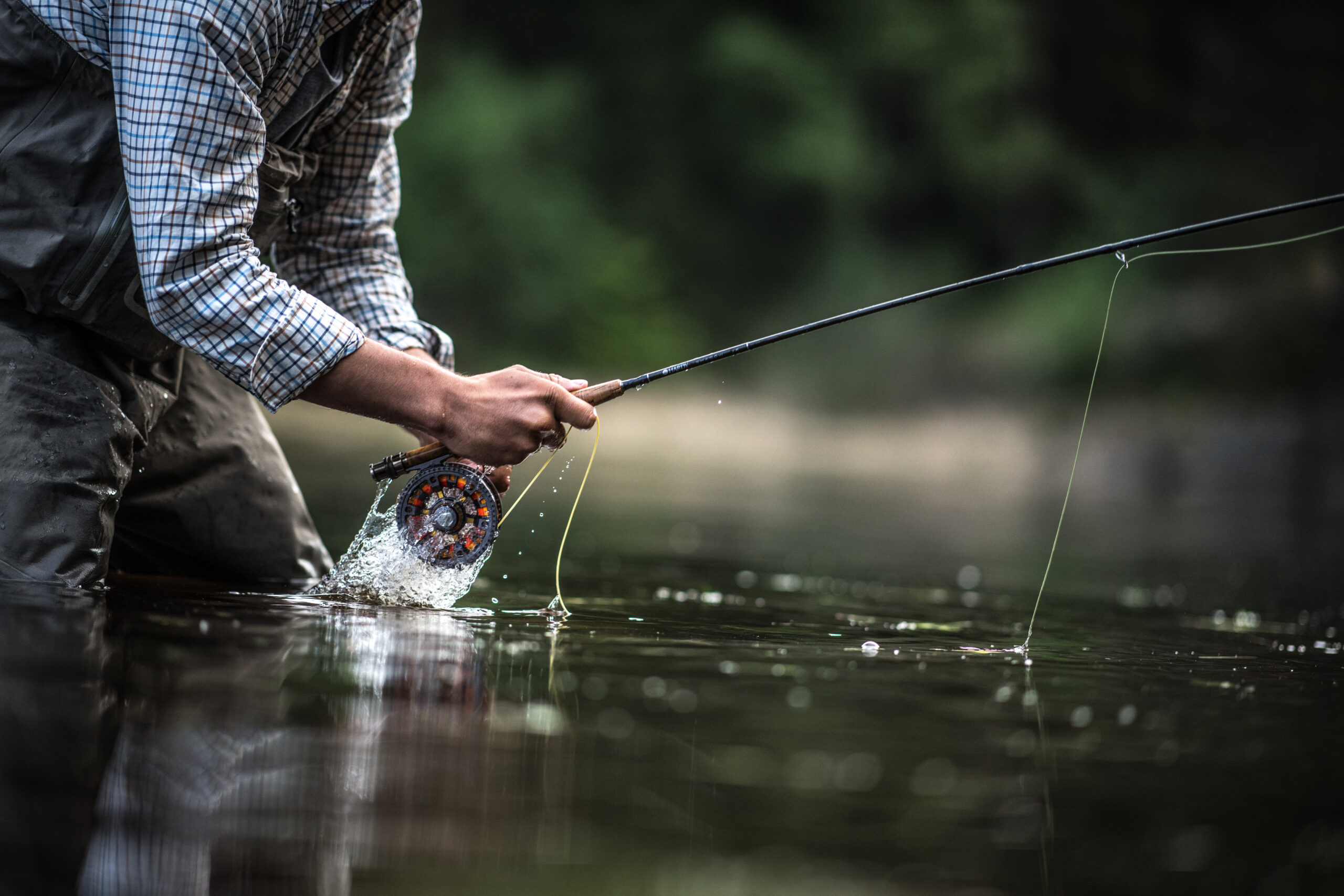How to Get Started With Fly Fishing: A Beginner’s Guide
More Than Just Fishing
Fly fishing is set apart from other angling methods. Unlike baitcasting or spin fishing, its emphasis lies not solely on the catch, but on the journey. It’s a conversation with the natural world, a chance to slow down and observe the delicate ecosystems found at the water’s edge.
In the Words of a President
President Herbert Hoover, an avid fly fisherman, put it best: “All men are equal before fish.” Fly fishing strips away status and reminds us of a humbling connection with something wilder and older than ourselves.
Understanding the Basics
Let’s clarify where fly fishing stands apart from other techniques and explore the fundamentals that’ll set you on the right path.
Key Differences: Fly Fishing vs. Spincasting
- The Gear: Fly fishing features specialized rods, weighted line, and lightweight lures (flies) that mimic insects. Spincasting uses rods with fixed reels, lighter line, and artificial lures often designed to resemble baitfish.
- The Motion: Fly casting utilizes the weight of the line to propel the fly with specific hand motions. Spincasting involves the simple, whip-like casting of lighter lures. * The Target: While both can catch a variety of species, fly fishing is often known for trout, while spincasting can target a wider range, including bass.
Overview of Fly Fishing Gear and Attire
- Rod & Reel: Rods are rated by “weight” for matching with a specific fly line. A 5-weight is a universal starting point. While important, don’t fret too much over your first reel – it primarily stores line.
- Fly Line: This comes in various densities (floating, sinking) and tapers for differing presentations. Ask your local fly shop for advice tailored to your fishing goals.
- Leaders & Tippet: These transparent line sections create a smoother transition from the fly line to your fly.
- Flies: Dry flies float on the surface (imitating hatching insects), nymphs sink (imitating larvae), streamers (minnow imitations). Beginners will do well with a core selection of each.
- Waders & Boots: Chest waders keep you dry, hip waders work for shallow spots. Felt-soled boots are best for river wading.
- Vest or Pack: To store essential tools (nippers, forceps, spare tippet, etc.) and plenty of flies.
Essential Gear for Beginners: Simple and Effective
- Rod & Reel Combo: Many manufacturers offer all-in-one beginner kits, a perfect way to start without feeling overwhelmed by choice.
- Fly Assortment: Start with a selection of basic nymphs (Hare’s Ear, Pheasant Tail), dry flies (Adams, Elk Hair Caddis), and a few streamers (Wooly Bugger).
- Waders & Boots: If fishing is frequent, prioritize waders made for comfort and breathability.
Fly Fishing Techniques
- The Art of Casting: Hands-on learning is best. Videos are great, but find a casting class or patient mentor to help you get the timing and form right.
- Basic Casting: The overhead cast is your foundation. Once mastered, you can refine specialty casts like the roll cast.
- Fly Tying: While not absolutely essential, tying your own flies adds a whole new layer of enjoyment. Simple patterns are easily mastered even by beginners.
Let’s Get Started!
Embrace the learning curve, be patient, and above all, find time by the water. Practice casting in your backyard between fishing trips to reinforce your skills. Fly fishing is meant to be enjoyed for a lifetime.
Would you like more specific recommendations with brands/products for those beginner set-ups, or a deeper dive into any specific technique? Let me know!
Fly fishing is more than just catching fish. It’s an art form, a connection with nature, and a beautiful way to spend time outdoors. If you’re curious about this elegant sport, this beginner’s guide will equip you with everything you need to start.
Fly fishing, at its core, is a dance. A dance between angler, the delicate imitation of an insect, and the unseen fish beneath the water’s surface.
It’s a sport steeped in centuries of tradition, yet it has a timeless appeal that transcends simple fish catching. But why would someone pick up a fly rod in our hurried, technology-filled world? Well, let’s dive in…
A Whisper of History, a Surge of Passion
The origins of fly fishing trace back to ancient times, evolving over centuries into the refined sport we know today. From the rivers of England to the mountain streams of America, fly fishing has held an allure for philosophers, presidents, and everyday people seeking something more than just a full cooler.

For me, the discovery of fly fishing began on a quiet stream during a family vacation. Witnessing the graceful arc of a line, the featherlight landing of a fly, ignited a fascination within me. That flicker of curiosity has turned into a lifelong passion.
Why Choose Fly Fishing?
While simply catching fish is part of the fun, fly fishing offers something deeper:
- Connection with Nature: Fly fishing puts you in the rhythm of the river, attuned to insect hatches and the subtle currents invisible to most. This immersion brings quiet reflection and heightened awareness of the natural world.
- The Challenge of Craft: Learning the intricate casts, delicate fly presentations, and reading the water demands focus and continuous refinement. Fly fishing is a sport for lifelong students.
- The Allure of the Impossible: Mimicking a fluttering insect with fur and feathers to deceive a discerning fish – it’s a feat of art and cunning that provides unmatched satisfaction.
Absolutely! Here’s a breakdown of the exciting world of fly fishing, focusing on what makes it so unique and appealing:
What is Fly Fishing?
Fly fishing is a distinct angling technique that uses lightweight artificial flies to lure fish. The “flies” are often designed to resemble insects and other aquatic creatures that fish feed on. Unlike traditional fishing with bait, fly fishing relies on the weight of the line and a skilled casting motion to deliver the fly with finesse and accuracy.
The Unmatched Thrill
Fly fishing offers a captivating blend of serenity, strategy, and excitement that has attracted anglers for centuries. Here’s why it’s so special:
- Challenge and Reward: Mastering the graceful casting techniques and understanding how to “read” the water requires skill and patience. This makes successfully landing a fish on a fly incredibly rewarding.
- Connection to Nature: Fly fishing often takes place in breathtaking natural settings. You’ll become intimately familiar with rivers, streams, lakes, and the wildlife that inhabit them.
- Outsmarting the Fish: Flies are meticulously designed to mimic the natural food of fish. The act of carefully selecting the right fly and presenting it in a convincing way creates a thrilling game of wits with your underwater opponent.
- The Excitement of the Fight: Even moderately sized fish put up a tremendous fight when caught on light fly tackle. Fly fishing offers a true test of skill and the pure adrenaline rush of battling a fish comes alive.
Popular Fly Fishing Destinations
The world is your oyster when it comes to fly fishing adventures. Here are some world-renowned destinations:
- Montana, USA: Montana’s iconic rivers like the Yellowstone, Madison, and Big Hole offer world-class trout fishing in picturesque mountain landscapes.
- New Zealand: Known for its crystal-clear rivers and large brown and rainbow trout, New Zealand is a fly fishing paradise.
- Alaska, USA: Home to all five species of Pacific salmon, plus giant rainbow trout and other species. Fly fishing in Alaska is an awe-inspiring wilderness experience.
- Argentina & Chile: The waters of Patagonia hold huge, wild trout offering stunning fishing in dramatic landscapes.
Getting Started
If you’re eager to try fly fishing:
- Lessons: Consider taking a lesson or two from a qualified instructor to learn the basics of casting and fly selection.
- Gear: Fly fishing gear may seem specialized, but you can start simply with a rod, reel, line, and a selection of flies. A local fly shop can provide essential advice.
- Guides: Booking a guided trip, especially in a new area, can fast-track your learning and increase your chances of success.
Let the Adventure Begin
Fly fishing is more than just catching fish. It’s a thrilling sport, a deep connection to nature, and an immersive activity that rewards skill and patience. Are you ready to embark on your own fly fishing adventure?
